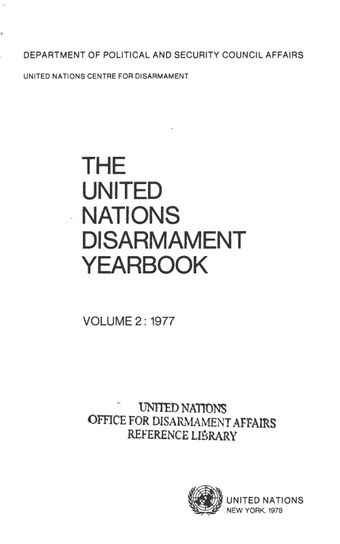Nuclear-Weapon-Free zones

- Author: United Nations Office for Disarmament Affairs
- Main Title: United Nations Disarmament Yearbook 1977 , pp 159-182
- Publication Date: December 1977
- DOI: https://doi.org/10.18356/aeca39c0-en
- Language: English
The concept of nuclear-weapon-free zones was developed in the course of disarmament negotiations at the United Nations and other international fora with a dual purpose. It was felt that those zones could contribute significantly to the general purpose of preventing the horizontal proliferation of nuclear weapons and, at the same time, would ensure the complete absence of such weapons from those areas of the world where States in the region would undertake a commitment to establish such zones. Important questions have been raised with regard to that concept, such as the perception of their own security by individual States, conditions in a particular region that might ensure the viability of a nuclear-weapon-free zone, concern about the threat of nuclear attack, the voluntary participation in the zone of the States located in the region and the danger of becoming involved in a nuclear conflict. There has also been widespread recognition that nuclear-weapon-free zones might contribute to the achievement of general and complete disarmament under effective international control, particularly nuclear disarmament.
© United Nations
ISBN (PDF):
9789210579810
Book DOI:
https://doi.org/10.18356/c762f5b7-en
Related Subject(s):
Disarmament
Sustainable Development Goals:
-
From This Site
/content/books/9789210579810s003-c006dcterms_title,dcterms_subject,pub_keyword-contentType:Journal -contentType:Contributor -contentType:Concept -contentType:Institution105
/content/books/9789210579810s003-c006
dcterms_title,dcterms_subject,pub_keyword
-contentType:Journal -contentType:Contributor -contentType:Concept -contentType:Institution
10
5

